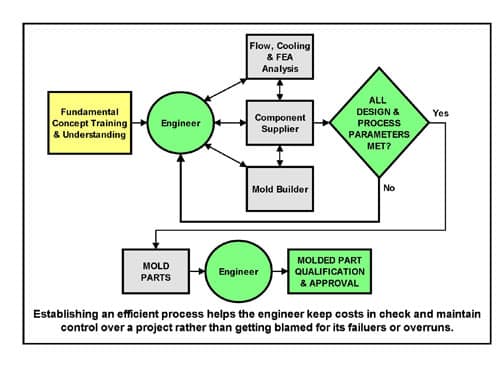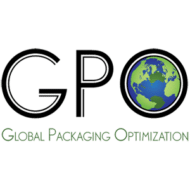The design of an injection molded component, the subsequent design and construction of the mold(s) to manufacture the component, and the definition and ongoing execution of an efficient injection molding process all require significant levels of specific expertise. These three functions are all highly related and have to be executed seamlessly, in unison, to consistently assure component development success. Component developments that are not properly managed and coordinated can be extremely costly to an organization. These costs can include personnel costs for additional work, start-up delays, mold modifications, packaging line inefficiencies and/or missed product sales.
Engineers are typically held responsible for delivering an injection molded package component development project. However, they are often at risk by not having control over the three functions normally completed by suppliers. This risk can be virtually eliminated by following a well defined process and gaining the requisite knowledge to lead the development to successful implementation.
While it could be an advantage to have internal expertise in all three areas, very few companies can justify the staffing costs. It is not critical for packaging engineers to master any one of these three functions in their careers to be successful, but it is critical for them to know how to manage the overall developmental process and consistently deliver successful programs on schedule.
The role of the engineer should be to ensure all the proper steps in a robust development process are completed and documented along the way, either internally or by the supplier. Understanding some basic part design and molding concepts and strictly staying in process can quickly prepare a packaging engineer to navigate their way through a program successfully. Junior engineers should be coached by management and experienced engineers to develop their skills and emphasize the importance of each step along the way. Understanding the concepts and adhering to the process will result in successful, timely mold start-ups (see diagram)
Note the keys to successfully developing and implementing injection molded components:
- Developing, implementing and strictly adhering to a process for injection molded part development, with well defined stage gate criteria that must be successfully completed and documented prior to progressing to the next phase
- Training your engineering staff on the basic fundamental concepts of part design, mold design and injection molding that will result in successful production, as they complete projects
- Partnering with competent suppliers who have experience in engineering and producing the type of part you want to manufacture
- Partnering with competent suppliers to perform the material Flow/Cooling and Finite Element Analysis (FEA) analyses
- Partnering with moldbuilders who have experience in building molds for the type of part you require and sign a moldbuilding agreement that guarantees construction quality and mold performance
- Using mold and part qualification processes that will assure that components can be consistently manufactured using a process that runs “in control and capable” immediately upon mold start-up and throughout the life of the mold.
The primary value gained through implementing a robust injection molded component training program and development process within an organization is significant because:
- Components are developed as efficiently as possible and will meet performance specifications
- Capital is not at risk for molds that might not perform well
- Expense spending is only on critical work
- Program timing will be achieved due to very low probability of problems during production start-up
- Resource planning for the future will be improved due to elimination of problems and achieving required time schedules
- Number of engineers qualified for component development programs will increase providing expanded options for staffing programs
- Job satisfaction for all involved will increase as a result of being successful
Robert C Collins II, CPP/MH is the President of Global Packaging Optimization, LLC (www.GPOpt.com) an organizational, process optimization and technical consultancy; Phone 781-635-7914 or email rcc2@GPOpt.com
Click here to download a PDF.
